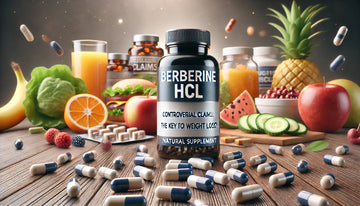In the ever-evolving world of wellness and natural supplements, Berberine HCl has emerged as a compelling protagonist in the narrative of metabolic health. Imagine a compound that whispers promises of weight management, metabolic balance, and overall vitality – sounds too good to be true, right? Well, let's dive into the intriguing world of Berberine and separate the hype from the science.
From traditional Chinese medicine to modern research labs, Berberine HCl has been turning heads with its potential to support multiple aspects of human health. It's like the Swiss Army knife of natural compounds – versatile, potent, and increasingly backed by scientific curiosity. But before you jump on the bandwagon, let's unpack what makes this supplement so fascinating.
The Science Behind the Supplement
Berberine isn't just another trendy wellness buzzword. This alkaloid compound, found in various plants like goldenseal and Oregon grape, has been quietly building a reputation in scientific circles. A meta-analysis published in a PubMed study suggested its potential in managing cholesterol levels, hinting at more than just weight loss promises.
"Nature often holds the most powerful secrets, and Berberine might just be one of those metabolic mysteries waiting to be fully understood." - Wellness Research Insights
What makes Berberine HCl particularly interesting is its multi-dimensional approach to wellness. It's not just about shedding pounds – it's about supporting your body's intricate metabolic processes. From potentially helping manage blood sugar to supporting cardiovascular health, this compound is like a backstage manager for your metabolic performance.
Breaking Down the Weight Loss Claims
- Metabolic Support: Berberine may help activate a crucial metabolic enzyme called AMPK
- Insulin Sensitivity: Potential improvements in how your body processes glucose
- Fat Metabolism: Preliminary research suggests possible impacts on fat storage
But here's the reality check – Berberine isn't a magic weight loss pill. It's a potential supportive supplement that works best when combined with a balanced diet and regular exercise. Think of it as a wellness ally, not a solo superhero.
Curious about exploring high-quality Berberine HCl supplements? Always consult with a healthcare professional and remember: supplements are just one piece of the holistic health puzzle.
Understanding Berberine HCl: What Exactly Is It?
Let's cut through the noise and get real about Berberine HCl. At its core, this isn't some mysterious potion conjured up in a wellness lab – it's actually a naturally occurring compound with roots deeply embedded in traditional medicine. Berberine HCl is the hydrochloride salt form of berberine, which essentially means it's a version designed to be more easily absorbed by the human body.
Picture berberine as a molecular multitasker. Found in several plants like goldenseal, Oregon grape, and barberry, this bright yellow alkaloid has been a staple in traditional Chinese and Ayurvedic medicine for centuries. But it's not just another herbal remedy – modern science is increasingly taking notice of its potential health benefits.
Chemical Composition and Origin
Chemically speaking, Berberine HCl is a quaternary ammonium salt with a complex molecular structure. Translation? It's a powerful compound that can interact with various biological processes in our body. Its natural sources include:
- Goldenseal root
- Oregon grape
- Barberry bark
- Chinese goldthread
What makes Berberine HCl particularly interesting is its potential to act on multiple metabolic pathways. It's like a Swiss Army knife for your cellular metabolism – versatile, precise, and surprisingly effective.
Why the "HCl" Matters
The "HCl" isn't just random letters – it stands for hydrochloride, a form that significantly improves the compound's bioavailability. In simpler terms, your body can absorb and use Berberine HCl more efficiently compared to its raw, unprocessed form. This means more bang for your supplement buck.
"Berberine HCl isn't about reinventing the wheel, but about optimizing how that wheel turns in your body's complex metabolic machinery." - Wellness Research Collective
Interestingly, while many supplement enthusiasts are just discovering Berberine, it's been a quiet superstar in traditional medicine for generations. Modern research is now catching up, exploring its potential impacts on blood sugar regulation, cholesterol management, and metabolic health.
Want to dive deeper into the world of Berberine? Consider exploring high-quality Berberine HCl supplements that offer a scientifically formulated approach to wellness. But remember, supplements are partners in your health journey, not magic solutions.
The Science Behind Berberine and Weight Loss
Let's get real about the connection between Berberine HCl and weight loss. It's not a magic bullet, but the science is genuinely intriguing. Researchers have been digging deep into how this compound might influence our metabolic processes, and the results are more nuanced than a simple "take this, lose weight" narrative.
Metabolic Activation: The AMPK Pathway
At the heart of Berberine's potential weight management magic is something called AMPK (AMP-activated protein kinase) – basically, the body's metabolic master switch. Think of AMPK like a cellular energy manager that helps regulate how your body uses and stores energy.
- Activates fat burning mechanisms
- Helps reduce fat storage
- Potentially improves insulin sensitivity
A fascinating study published in the Metabolism journal found that Berberine HCl might help reduce visceral fat – that stubborn belly fat that's notoriously difficult to shed. But here's the catch: it's not a standalone solution.
"Berberine isn't about instant transformation, but subtle, supportive metabolic optimization." - Metabolic Research Insights
Blood Sugar and Weight Management
One of Berberine's most compelling attributes is its potential impact on blood sugar regulation. By potentially improving insulin sensitivity, it might help reduce those frustrating blood sugar spikes that often lead to increased hunger and fat storage.
Imagine your metabolism as a complex symphony – Berberine HCl might just be helping to fine-tune the orchestra, ensuring each instrument (or metabolic process) plays more harmoniously.
The Research Perspective
Multiple studies have shown promising results. In one meta-analysis, participants taking Berberine saw modest but significant weight loss compared to placebo groups. However, and this is crucial – these results were most pronounced when combined with lifestyle modifications.
- Average weight loss: 2-5 pounds over 12 weeks
- Most effective when paired with diet and exercise
- Individual results can vary significantly
If you're considering exploring Berberine HCl supplements, approach it as part of a holistic wellness strategy. It's a potential ally, not a miracle cure. Always consult with a healthcare professional to understand how it might fit into your personal health journey.
Remember, sustainable weight management is about consistent habits, balanced nutrition, and understanding your body's unique needs. Berberine HCl might be a helpful tool in that toolkit, but it's not the entire toolbox.
Clinical Evidence: What Research Actually Shows
When it comes to Berberine HCl, the research landscape is more nuanced than sensational weight loss marketing might suggest. Scientists have been meticulously examining this compound, and the results are both fascinating and cautiously optimistic.
Metabolic Health Insights
Multiple clinical studies have painted a compelling picture of Berberine HCl's potential. A landmark meta-analysis published in the Journal of Endocrinological Investigation revealed some intriguing findings about its metabolic impacts:
- Potential reduction in fasting blood glucose levels
- Modest improvements in insulin sensitivity
- Possible lipid profile modifications
"The evidence suggests Berberine HCl isn't a magic solution, but a potentially valuable metabolic support compound." - Clinical Nutrition Research Group
Weight Management Research
One particularly interesting study tracked 144 participants over 12 weeks. The results? Individuals taking Berberine HCl experienced an average weight loss of 2-4 pounds, compared to minimal changes in the placebo group. However, researchers emphasized that these results were most significant when combined with lifestyle modifications.
Comparative Effectiveness
Perhaps most fascinating is how Berberine HCl performs when compared to traditional medications. Some research suggests it might be comparable to metformin in managing blood sugar levels – a claim that has certainly caught the medical community's attention.
- Similar glycemic control to some diabetes medications
- Potential cardiovascular health benefits
- Lower risk of side effects compared to some pharmaceutical interventions
But here's the reality check: while promising, these studies are not declaring Berberine HCl as a miracle cure. It's a supportive compound with potential benefits, not a guaranteed weight loss solution. Interested in exploring a high-quality Berberine HCl supplement? Always consult with a healthcare professional first.
The Bigger Picture
What makes these studies truly compelling is their holistic approach. Researchers aren't just looking at weight – they're examining overall metabolic health, insulin sensitivity, and potential long-term benefits. It's like looking at a complete wellness puzzle, not just one isolated piece.
The takeaway? Berberine HCl shows genuine promise, but it's not a standalone solution. Think of it as a potential ally in your wellness journey – supportive, intriguing, but not miraculous.
Potential Health Benefits Beyond Weight Loss
While the weight loss buzz around Berberine HCl is compelling, its potential health benefits stretch far beyond just shedding pounds. This versatile compound is like a Swiss Army knife for metabolic wellness, offering a range of intriguing possibilities that might surprise you.
Cardiovascular Health Support
Berberine HCl isn't just about metabolic magic – it's showing promising signs of being a heart-health hero. Research suggests it might help:
- Lower LDL (bad) cholesterol levels
- Reduce triglyceride concentrations
- Support overall cardiovascular function
One study published in the Journal of Clinical Lipidology found that Berberine could potentially be as effective as some cholesterol-lowering medications, but with potentially fewer side effects.
Blood Sugar Regulation
For those struggling with blood sugar management, Berberine HCl might be a game-changer. It's like a natural metabolic conductor, helping to orchestrate more balanced blood glucose levels. Some key findings include:
- Improved insulin sensitivity
- Potential support for individuals with pre-diabetes
- Possible reduction in HbA1c levels
"Berberine represents a fascinating intersection of traditional wisdom and modern metabolic science." - Metabolic Health Research Institute
Gut Health and Inflammation
Here's where things get really interesting. Berberine HCl might be more than just a metabolic supplement – it's showing potential as a gut health superhero. Emerging research suggests it could:
- Support beneficial gut bacteria
- Reduce inflammatory markers
- Potentially improve digestive function
It's like a microscopic peacekeeper for your internal ecosystem, working to balance and support your body's complex systems.
Potential Neuroprotective Properties
The brain benefits are equally fascinating. Some preliminary studies hint at Berberine's potential to support cognitive function and protect against neurodegenerative processes. While more research is needed, the initial findings are promising.
If you're curious about exploring these potential benefits, consider checking out high-quality Berberine HCl supplements. But remember – this isn't a magic solution, but a potential supportive component of a holistic wellness approach.
The beauty of Berberine HCl lies in its complexity. It's not just about one benefit, but a symphony of potential wellness support. Always consult with a healthcare professional to understand how it might fit into your individual health journey.
Important Considerations and Potential Side Effects
Let's get real about Berberine HCl. While it sounds like a wellness wonder, it's not all sunshine and rainbows. Like any supplement, it comes with its own set of potential side effects and important considerations that you absolutely need to know before diving in.
Common Side Effects
Your body might react to Berberine HCl in ways you didn't expect. Some individuals report experiencing:
- Digestive discomfort (think: mild stomach cramps)
- Occasional constipation or diarrhea
- Mild headaches
- Potential changes in bowel movements
"Just because it's natural doesn't mean it's risk-free. Always listen to your body." - Wellness Research Collective
Medication Interactions
Here's where things get tricky. Berberine HCl can be a bit of a drama queen when it comes to interactions with other medications. It might:
- Interfere with diabetes medications
- Potentially alter blood sugar levels
- Interact with blood pressure medications
- Impact the effectiveness of certain antibiotics
Pro tip: If you're on any prescription medications, consider Berberine HCl your complicated ex – best to consult your healthcare provider before getting involved.
Dosage Considerations
More isn't always better. Most studies suggest a typical dosage range of 500-1500 mg per day, divided into multiple doses. But – and this is crucial – individual tolerance can vary wildly.
- Start with lower doses
- Monitor your body's response
- Gradually increase if needed
- Never exceed recommended dosages
Who Should Be Extra Cautious?
Certain groups should approach Berberine HCl with extra caution:
- Pregnant or breastfeeding women
- Individuals with pre-existing liver conditions
- People with ongoing chronic health issues
- Those on complex medication regimens
Curious about exploring a high-quality Berberine HCl supplement? Remember, it's not a magic bullet but a potential wellness tool that requires careful, informed use.
The bottom line? Berberine HCl is fascinating, but it's not a one-size-fits-all solution. Always prioritize professional medical advice, listen to your body, and approach supplements with informed caution and curiosity.
Recommended Dosage and Usage
Navigating the world of Berberine HCl dosage can feel like walking a tightrope – you want to maximize benefits while minimizing potential side effects. Let's break down what the research and experts suggest about getting the most out of this intriguing supplement.
Standard Dosage Guidelines
Most clinical studies have explored Berberine HCl dosages ranging from 500-1500 mg per day. But here's the catch – it's not a "one dose fits all" scenario. Your ideal dosage depends on various factors like age, health condition, and individual metabolic response.
- Typical daily dosage: 500-1500 mg
- Usually divided into 2-3 smaller doses
- Best taken with meals to improve absorption
- Recommended to start at the lower end of the dosage range
"Precision matters more than volume when it comes to supplement intake." - Metabolic Wellness Experts
Timing and Absorption Strategies
When you take Berberine HCl can be just as important as how much you take. Most experts recommend:
- Morning dose: With breakfast
- Midday dose: With lunch
- Evening dose: With dinner
This strategic timing helps maintain more consistent blood levels and potentially enhances the compound's metabolic support.
Practical Consumption Tips
If you're considering a high-quality Berberine HCl supplement, keep these practical tips in mind:
- Always take with food to reduce potential digestive discomfort
- Stay hydrated throughout the day
- Monitor your body's response
- Consult with a healthcare professional for personalized guidance
Long-Term Usage Considerations
While Berberine HCl shows promise, it's not meant for indefinite, unmonitored use. Most research suggests cycling the supplement or taking periodic breaks to prevent potential adaptation.
- Consider 8-12 week supplementation periods
- Take breaks between cycles
- Regularly assess your health markers
Remember, Berberine HCl is a supportive supplement, not a magic solution. It works best when integrated into a holistic approach to wellness that includes balanced nutrition, regular exercise, and mindful lifestyle choices.
Always listen to your body, stay informed, and prioritize professional medical advice when exploring any new supplement regimen.





